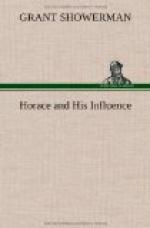These facts receive greater significance from an appreciation of the poet’s sincerity and independence. He will restore to Maecenas his gifts, if their possession is to mean a curb upon the freedom of living his nature calls for. He declines a secretaryship to the Emperor himself, and without offense to his imperial friend, who bids him be free of his house as if it were his own.
But Horace must submit also to the more impartial judgment of time. Of the two innovations which gave him relief against the general background, one was the amplification of the crude but vigorous satire of Lucilius into a more perfect literary character, and the other was the persuasion of the Greek lyric forms into Roman service. Both examples had their important effects within the hundred years that followed on Horace’s death.
The satire and epistle, which Horace hardly distinguished, giving to both the name of Sermo, or “Talk,” was the easier to imitate. Persius, dying in the year 62, at the age of twenty-eight, was steeped in Horace, but lacked the gentle spirit, the genial humor, and the suavity of expression that make Horatian satire a delight. In Juvenal, writing under Trajan and Hadrian, the tendency of satire toward consistent aggressiveness which is present in Horace and further advanced in Persius, has reached its goal. With Juvenal, satire is a matter of the lash, of vicious cut and thrust. Juvenal may tell the truth, but the smiling face of Horatian satire has disappeared. With him the line of Roman satire is extinct, but the nature of satire for all time to come is fixed. Juvenal, employing the form of Horace and substituting for his content of mellow contentment and good humor the bitterness of an outraged moral sense, is the last Roman and the first modern satirist.
The Odes found more to imitate them, but none to rival. The most pronounced example of their influence is found in the choruses of the tragic poet Seneca, where form and substance alike are constantly reminiscent of Horace. Two comments on the Odes from the second half of the first century are of even greater eloquence than Seneca’s example as testimonials to the impression made by the Horatian lyric. Petronius, of Nero’s time, speaks of the poet’s curiosa felicitas, meaning the gift of arriving, by long and careful search, at the inevitable word or phrase. Quintilian, writing his treatise on Instruction, sums him up thus: “Of our lyric poets, Horace is about the only one worth reading; for he sometimes reaches real heights, and he is at the same time full of delightfulness and grace, and both in variety of imagery and in words is most happily daring.” To these broad strokes the modern critic has added little except by way of elaboration.
The Life of Horace, written by Suetonius, the secretary of Hadrian, contains evidence of another, and perhaps a stronger, character regarding the poet’s power. We see that doubtful imitations are beginning to circulate. “I possess,” says the imperial secretary, “some elegies attributed to his pen, and a letter in prose, supposed to be a recommendation of himself to Maecenas, but I think that both are spurious; for the elegies are commonplace, and the letter is, besides, obscure, which was by no means one of his faults.”




